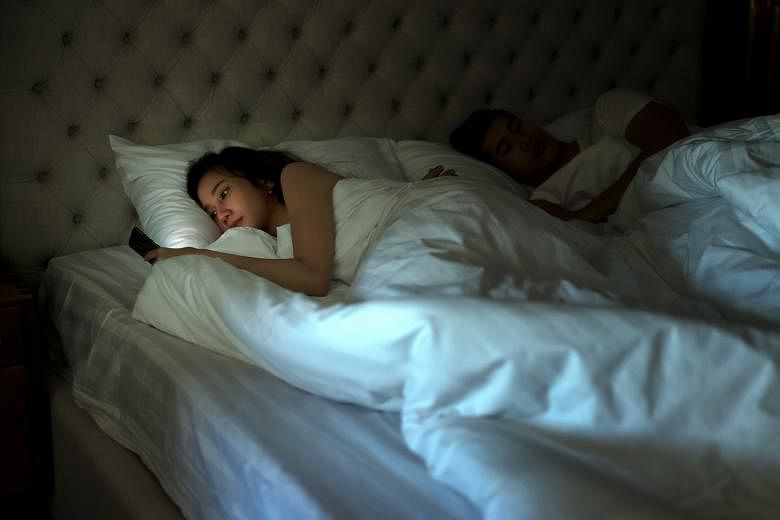For the past month or so, Ms Sarah Chew, 27, was waking up every hour at night and struggling to sleep through till the next morning.
"I'd look at the clock on my mobile phone, watching every minute crawling by and wondering how many more hours I had left to sleep before waking up for work," said Ms Chew, who lives with her husband in a Punggol flat. The lack of quality sleep left her feeling sleepy during the day, she added.
The civil servant, who used to go to bed at 10.30pm and wake up at 6.30am before the circuit breaker period started early last month, sought help from a clinical psychologist via a videoconference about three weeks ago for her sleep troubles. After following a sleep routine established by the psychologist for a week, Ms Chew no longer wakes up in the middle of the night.
Fewer social interactions, not needing to commute or go for meetings and not being able to visit her parents on weeknights - those were changes in her routine that she thinks led to the sleeplessness.
"The lack of activity left me with a lot of energy at the end of the day," said Ms Chew, who is working from home during this period.
She is among those whose sleep patterns have been disrupted by the circuit breaker measures that started on April 7. While clinics and hospitals that The Straits Times spoke to said there has been no increase in the number of patients seeking help for sleep-related issues, doctors point out that it could be a growing problem that has been under the radar.
Dr Lim Boon Leng, a psychiatrist at Gleneagles Medical Centre, said that because his clinic is now seeing only patients with urgent medical needs, the number of patients seeking help for sleep-related issues has decreased.
Nevertheless, existing patients have complained of sleep issues more than before, said Dr Lim, who believes there are many more people with sleep difficulties not stepping forward. "Covid-19 is a life-threatening illness and many are afraid of being infected or that their loved ones may get the illness. The pandemic has also dragged on with no end in sight, causing many to feel tired of the continued bombardment of bad news in the media and uncertainties over the future."
These factors, coupled with worries about financial security and feelings of isolation arising from social distancing measures, could also be keeping people up at night, said Dr Lim, adding that insomnia could also be a sign of a larger issue.
Those vulnerable to psychiatric conditions due to genetic factors, personality issues and poor social support are more likely to lapse into mental health illnesses, with insomnia as one condition, he said.
-
Tips on having a good night's sleep
-
WHAT TO DO IN THE DAY
• Have a clear demarcation between work areas and non-work areas at home if you're telecommuting.
• Keep to the same work hours.
• If you need to raise an unpleasant issue at work or at home, do it early in the day.
• Get some sunlight during the day by, for example, sitting beside a brightly lit window when you work.
• Get some exercise to expend excess energy and increase your sleep drive at night, but avoid working out too close to bedtime.
• Cut down on smoking, alcohol and caffeinated products such as coffee, tea and cola.
• Avoid daytime naps. If you have to nap, limit it to 30 minutes or less.
WHAT TO DO AT BEDTIME
• Keep to a regular sleep-wake schedule.
• Establish a 30-minute bedtime routine such as reading a book.
• Keep the bedroom dark, quiet and at a comfortable temperature near bedtime.
• Use the bed only for sleep and intimacy. Using it for other activities such as working causes the brain to associate the bed with a state of wakefulness.
HOW TO FIGHT STRESS
• Make time for relaxation and set aside time to do something you enjoy.
• Limit consumption of Covid-19-related news if you find yourself worrying about the pandemic.
Vanessa Liu
Dr Sin Gwen Li, senior consultant in the department of psychiatry at Singapore General Hospital, said that sleep can be affected during this period when people are no longer going to work and school.
She added: "Many parents have to grapple with home-based learning and young children's needs in the day, and thus are forced to work only after the children have gone to bed. The divide between work time and play time also becomes less demarcated as people work late, such as attending videoconferences after office hours."
While some have trouble sleeping at night, others are pulling late nights by choice, spending the witching hours playing video games and watching dramas.
Ms Yu Hui Xin, 21, told The Straits Times she stays up till 5am or 6am every day to play online games with her friends. The second-year accountancy student from Nanyang Technological University said that sometimes after she has turned off the computer, she is unable to fall asleep till an hour after.
"Usually after a social event - even though in this case it is virtual - I need some time alone by myself. So I will think about stuff for about an hour before going to sleep."
Dr Lee Yeow Hian, consultant chest and sleep physician at Mount Elizabeth Novena Hospital, said people like Ms Yu may experience insomnia resulting from overstimulation if they go to bed immediately after playing games or watching a drama series. He added that they may have difficulties re-adjusting to a normal schedule.
Health experts have pointed out that lack of sleep could affect one's well-being and is linked to higher risks of illnesses. Dr Sin said long-term sleep deprivation may also lead to reduced immunity.


